Henry Cloud's Blog, page 18
June 2, 2016
Why Smart People Accept Unacceptable Relationships
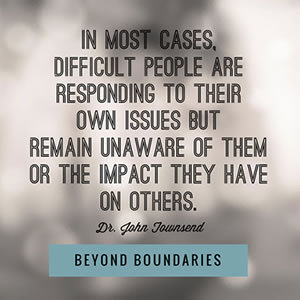 When I (Dr. Townsend) guide people through a process of examining previous difficult relationships, the one question I have found most helpful is this: What was the “payoff” in your choice? In other words, what good things did you think you’d get when you began a relationship with that person?
When I (Dr. Townsend) guide people through a process of examining previous difficult relationships, the one question I have found most helpful is this: What was the “payoff” in your choice? In other words, what good things did you think you’d get when you began a relationship with that person?
We wind up with difficult people for a reason—there was something we valued, wanted, or hoped for. And because the need was strong, we may not have paid attention to something unacceptable in that person’s character. We either minimized or denied some sign, some reality, some warning light that all was not well. And the character problem ended up being a bigger deal than we thought.
When smart people accept unacceptable relationships, they tend to see traits and abilities in others that they think will make life better for them. We see positive aspects of a person’s psyche that we are drawn to or feel we need. A longing for them dulls an awareness of that person’s darker side. Here are a few examples. For some period of time in the relationship, the person had the following:
Warmth: She was gentle and nurturing with me
Affirmation: He saw the good in me
Safety: He did not condemn or judge me
Structure: She was organized and got things done
Humor: She helped lighten the burdens and cheered me up
A great family: His relatives were much healthier than mine
Drive: She was focused and knew where she was going
Initiative: She took risks and was brave in making decisions
Competency: He was talented, and I needed his talent in my organization
People skills: He handled people better than I did, so I depended on him
Intelligence: She was smart, and I needed smarts in my department
In the toughest cases, the trait is simply that “he liked me.” That is, sometimes people feel so alone and desperate that they are grateful just for someone to be pursuing them, no matter what that person’s character may be.
We have an ability to spin the truth when it comes to our relationships. When we want something so badly that we ignore reality. Love is not blind, but desire can be. Here are some examples of how we spin the truth:
You allowed him to control you because you were weak and afraid.
You ignored detachment and disconnection because she was a nice person.
You minimized irresponsibility because she had a great personality and charm.
You put up with his tendency to divide people on the team because he was a good strategist.
You didn’t pay attention to childishness because she was needy, and you felt protective.
You let him into your life because you were compliant and guilt-based, and he was free and a rebel.
Do you see how the problem occurs? It is an insidious process. It tends to occur slowly over time. The good aspects are generally apparent and right out there. The bad ones don’t come out until later, when the euphoria wears off and the honeymoon is over. We are simply not aware of the repercussions while we are in the middle of the relationship. Instead, we are focused on solving problems, improving things, questioning our own judgment, and trying to be positive about it all. It’s not until later, after we have some distance, that we can gain clarity and perspective on the true dynamics of what went on.
Here are a few questions to help you review your relationships and gain some helpful insights:
What drew me to this person?
What led me to think this person had what I needed?
When did I first notice a significant problem in the relationship?
How did I minimize the problem in order to get the good from the person?
What was the result of minimizing the problem?
The information you gather here will help you avoid these issues in future relationships. This doesn’t mean that the other person has some plan or agenda to hook you in. This occurs sometimes, but certainly not always. In most cases, difficult people are responding to their own issues but remain unaware of them or the impact they have on others. I say this to prevent you from feeling like you were sucked into a trap. Most of the time, both parties are in a dysfunctional dance, and neither one knows what’s going on. The difference now is that you can choose to stop dancing so that your future will be better than your past!
________
If you’ve been burned by a bad relationship, don’t let the past repeat itself. Read Beyond Boundaries and discover how to tell who you can trust and learn the keys to know when you’re in a healthy relationship.
The post Why Smart People Accept Unacceptable Relationships appeared first on Boundaries Books.
June 1, 2016
God’s Design for Parenting: Standing Together
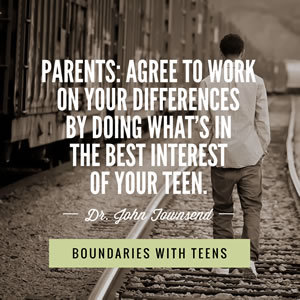 Are you and your spouse united or divided in your parenting? Consider the following dialogue:
Are you and your spouse united or divided in your parenting? Consider the following dialogue:
Dad: “You’re letting our daughter do anything she wants.”
Mom: “You’re too strict with her.”
Dad: “She needs more discipline and structure.”
Mom: “She needs more love and encouragement.”
Dad: “She’s becoming irresponsible and out of control.”
Mom: “She’s becoming insecure and afraid.”
And you thought kid and teenagers had conflicts! This conversation illustrates a primary problem that results when parents can’t agree on how to parent. Rather than doing what they need to do for their kids — put her together — divided parents pull their kids apart.
Of course, no parents agree on everything. But in the best situations, they agree on the most important things and disagree only on styles, preferences, and smaller matters. This is what God intended, but often parents get in the way of God’s design. When parents are far apart in their values and perceptions of their children, the kid loses out. She has no one to contain and integrate her internal divisions. Her unifying environment is split up, so her inner conflicts remain stuck, and can get worse.
If one parent is loving but has poor boundaries, and the other has good boundaries but is not very loving, their kids will likely be undeveloped in her ability to love and to set limits. She will have difficulty being open and vulnerable, taking responsibility, and staying attached in conflict. She will struggle to work through problems. Clearly, the stakes of split parenting are high.
If you and your spouse have significant disagreements about your kids, you can begin to resolve your conflicts — and go a long way toward maturing your child — by doing the following:
1. Agree that your teen comes first.
Talk about your conflicting viewpoints, and agree to work on your differences by doing what’s in the best interest of your teen. Protect your teen, and find a way to agree on love and limits.
2. Defer to each other’s strengths.
Most parents each have an area of strength. Agree that, for your teen’s sake, you will defer to the strengths of the other. For example, if you have difficulty providing clear structure for your teen, you might ask your spouse for help and guidance. Or, if you can’t listen and understand at the emotional levels your child needs, get your spouse involved in the conversation.
3. Don’t triangulate your teen.
Sometimes parents will forget their role and involve their teen in their conflicts with each other. This is called triangulation, and leads to all kinds of problems, such as one parent indulging the teen with privileges, freedom, and gifts as a way of stealing the kid’s love from the other parent. The other parent reacts by using too much strictness and discipline in order to prove the spouse’s indulgent approach wrong. If you and your spouse are triangulating, stop. Agree to work out your differences. Consult a third party — such as a friend, pastor, or counselor — if the triangulation continues.
God designed parenting to be executed by a mom and a dad who love each other, support each other’s parenting, make up for each other’s limitations, and correct each other’s mistakes. It is a very good system when it works as planned. So work together to become united rather than divided parents. After all, you are your teen’s most important guide for how life is supposed to be lived. Kids do best when their parents stand together. Give your teen what he or she needs.
________
For more helpful advice on this topic, read Chapter 5 in Boundaries with Teens. Learn how to help your teens mature while maintaining your sanity!
The post God’s Design for Parenting: Standing Together appeared first on Boundaries Books.
May 9, 2016
7 Tips for Setting Summer Boundaries with Your Kids
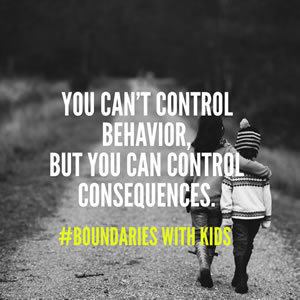 It is scary how our kids can sense when we are weak and ready to give in to them. This can be especially true during the summer when kids are home all day and away from the structured environment of school. Without boundaries, kids learn how to beg, plead, argue, and rationalize to get out of their responsibilities. The later you start to enforce boundaries, the more energetically your children will resist. Here are seven tips to help you set important boundaries with your kids this summer:
It is scary how our kids can sense when we are weak and ready to give in to them. This can be especially true during the summer when kids are home all day and away from the structured environment of school. Without boundaries, kids learn how to beg, plead, argue, and rationalize to get out of their responsibilities. The later you start to enforce boundaries, the more energetically your children will resist. Here are seven tips to help you set important boundaries with your kids this summer:
1. Create summer structure
Develop boundaries that you need for your family and present them to your child, such as taking time each day to play on their own, reading a book, cleaning their room, going to bed on time, etc. You and your child both need to be a part of this process. The more you involve her in it, the more likely she is to take ownership of it and cooperate in her own growth. Invite her to partner with you, even though the plan is still going to be executed if she refuses.
2. Introduce new boundaries at a peaceful time.
Pick a good time and place when you and the child are getting along to discuss boundaries. Don’t raise the issue in the middle of a screaming match. That only serves to polarize things, and the child often feels forced to react more strongly against you to maintain separateness.
3. Take a “for” stance instead of an “against” stance.
Let kids know that setting boundaries isn’t about forcing her to do something or making their summer miserable. Tell her you see a problem that’s hurting her and negatively affecting the family. You want to deal with it because you love her, and you want to do it together with her.
4. Present boundaries using specific terms.
Make boundaries specific. For example, you could say, “Your yelling and running behavior around the house is a problem. It’s disruptive and it doesn’t seem to be getting better.”
5. Present the consequences.
When your boundaries aren’t respected, take a big breath and be direct. Don’t be afraid of the bad news. You aren’t hurting her; you’re freeing her from herself! Emphasize her freedom in meeting your expectations. She doesn’t have to do anything; she can choose to act as if you don’t exist. The key is that if she chooses to resist, the consequences will become a reality. Remember: You can’t control the behavior, but you can control the consequences. Stay in control of what is yours and encourage her freedom to choose.
6. Negotiate what is negotiable
Let the child have some input, within parameters, on expectations and consequences. Giving on something minor may pay off, as the child will feel less helpless and more involved in her destiny. Let her know that you may adjust something later if she proves herself for some period of time. Don’t budge on the non-negotiables, however. Drugs, alcohol, premarital sex, and violence are not gray areas.
Many times a child will protest, “You don’t do that, why should I?” This happens in many contexts, including bedtime, spending money, and free time. The reality is, however, that adults do have more freedom than kids, because they are more responsible. Responsibility brings freedom. Tell your child about that. Hold it out as an incentive to accept the boundaries. Growing up has its rewards.
7. Follow through during the summer.
Your child is on a learning curve, and learning takes many trials. Expect her not only to transgress the boundary, but also to protest the consequences many times. Be patient with yourself, too. Stay with it and follow through as consistently as you can. If you find you are not able to do that, seek help from mature friends who may be able to explore with you whether the problem is one of resources, abilities, character, or unrealistic expectations. Then you can make adjustments as needed during the summer break.
________
Get the help you need this summer to raise kids who take responsibility for their actions, attitudes, and emotions. Drs. Henry Cloud and John Townsend take you through the ins and outs of instilling the kind of character in your children that will help them lead balanced, productive, and fulfilling adult lives in Boundaries with Kids. Learn how to:
Set limits and still be a loving parent
Bring control to a chaotic family life
Define age-appropriate boundaries and consequences for your kids
The post 7 Tips for Setting Summer Boundaries with Your Kids appeared first on Boundaries Books.
May 2, 2016
The Best Boundaries Words for Kids
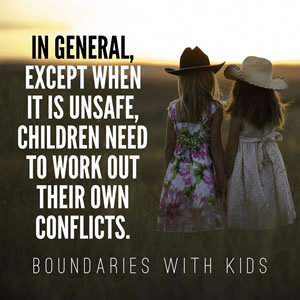 I (Dr. Cloud) can still remember what happened that day when I was eight years old. I made a big mistake, but I didn’t know it at the moment. I thought I was getting back at my sister, who was sixteen at the time. Opportunities for revenge were few and far between, and I was not about to let this one slip by. Sharon and her friend were goofing around in the den when one of them threw a pillow and broke the overhead light. They quickly figured out a way to arrange the light in such a way that you could not tell it was broken. They thought that they were off the hook. Little did my sister know that she had a sociopathic little brother with a plan.
I (Dr. Cloud) can still remember what happened that day when I was eight years old. I made a big mistake, but I didn’t know it at the moment. I thought I was getting back at my sister, who was sixteen at the time. Opportunities for revenge were few and far between, and I was not about to let this one slip by. Sharon and her friend were goofing around in the den when one of them threw a pillow and broke the overhead light. They quickly figured out a way to arrange the light in such a way that you could not tell it was broken. They thought that they were off the hook. Little did my sister know that she had a sociopathic little brother with a plan.
When my father came home, I could not wait to tell him what they had done. I told him that they had broken the light, and he asked me to show him. I led him into the den, not knowing that Sharon and her friend were still in there. I was caught. Here he was, asking me about the broken light, and there they were, watching me seal my fate as a tattletale. I do not remember what he did to them, but I can still recall what they did to me, and it was not pretty.
In general, except when it is unsafe, children need to work out their own conflicts. Let them solve their problems themselves. For example, it’s okay for parents to say, “I don’t know why you are telling me. You need to work it out with your brother. He’s the one you’re mad at.” Or, “Go work it out with your sister first. If the two of you can’t settle it, then I might talk to you.” Do whatever you can to keep the conflict between your kids so they learn the necessary conflict resolution skills.
If the conflict is with friends, let your kids work it out. This is what they are going to have to do later in life. Talking with them about how to do conflict resolution is okay, but requiring them to do it is important. The same goes for their problems with the school and other authorities. Certainly, there are times for conferences and meetings. But take every step to have your children work out the problems they are having with the school or organization. If Mom and Dad are always there to step in with authorities and “fix” it, the child will be lost when her first employer is upset with her performance.
The problem is that we (and our kids) may have difficulty knowing what to say when we have conflict with others. We learn what to say over time, but it is a good idea to teach your children what to say and even role-play how they will say things to others when they need to set limits. They are dealing with peer pressure, hurtful kids, and strong personalities on the playground. If they are prepared, they will fare better. Here are some examples of words to arm them with:
“No.” Period. Teach them how to say it.
“No, I don’t feel comfortable with that.”
“No, I don’t want to.”
“No, I won’t do that.”
“No, my parents don’t allow that.”
“No, God does not want me to do that.”
“No, I learned that we don’t touch each other’s private places.”
“No, I don’t like drugs. They kill people.”
These words may sound simple and somewhat trite. But, some children need to know the words ahead of time and have some practice on how to use them. Role-play with them, or find a setting or group for them that does this kind of reinforcing of boundaries.
Your child must learn to take his feelings, fears, thoughts, desires, and all of his other experiences into relationship. And if those conflicts have to do with a specific person, they need to work it out with that person whenever possible.
________
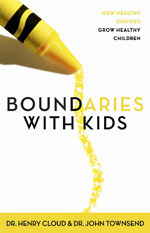 Get more proven advice to raise kids who take responsibility for their actions, attitudes, and emotions in Boundaries With Kids. Drs. Henry Cloud and John Townsend take you through the ins and outs of instilling the kind of character in your children that will help them lead balanced, productive, and fulfilling adult lives. Learn how to:
Get more proven advice to raise kids who take responsibility for their actions, attitudes, and emotions in Boundaries With Kids. Drs. Henry Cloud and John Townsend take you through the ins and outs of instilling the kind of character in your children that will help them lead balanced, productive, and fulfilling adult lives. Learn how to:
Set limits and still be a loving parent.
Bring control to a chaotic family life.
Define age-appropriate boundaries and consequences for your kids.
Click here to read a sample chapter, watch a teaching video, and purchase your copy.
The post The Best Boundaries Words for Kids appeared first on Boundaries Books.
April 26, 2016
When Negatives Are Really Positives
 Written by Dr. John Townsend, exclusive to BoundariesBooks.com.
Written by Dr. John Townsend, exclusive to BoundariesBooks.com.
People who have a hard time setting limits in their relationships often are concerned about their effect. They don’t want to be negative with others. For example, a wife with a controlling husband may be afraid he will become angry if she says no to his control. A father may fear alienating his adult child when he sets a time limit on how long he can live at home. Or a boss may be concerned about morale dropping if he has to have a tough talk with a key employee. As a result, they often postpone the talks that need to happen.
It is true that confronting problems and setting limits is not a “positive” experience. That is, it involves some difficult talks and actions that feel negative in nature. People can react in defensive, angry or hurt ways. However, just because something feels negative at the time doesn’t mean it will have a negative outcome.
A “no” can often result in a problem solved. Speaking the truth in love (see Ephesians 4:15) and setting an appropriate limit may result in very healthy outcomes. The husband gets defensive, then in time sees that he is not being loving to his wife, and changes. The adult child becomes resentful, then moves out and gets a job and finds his own apartment. The key employee doesn’t have a great response to the confrontation, but then changes his behavior and things go better at work.
On the other hand, avoiding the negative can actually increase our misery. The husband, the adult child and the employee continue in their behaviors, and things can get worse, with no realistic hope that matters will improve.
God calls this sowing and reaping: “Do not be deceived: God cannot be mocked. A man reaps what he sows” (see Galatians 6:7). If we sow honesty and healthy boundaries, it may not be fun, but it should reap improved relationships, more freedom and solved problems. Sowing these healthy “negatives” will in time reap healthy positive outcomes.
Have courage. Face that tough talk and set some healthy limits. And pray for God to help you be patient for the reaping you need.
________
Learn more about setting boundaries from the New York Times bestseller Boundaries by Dr. Henry Cloud and Dr. John Townsend.
The post When Negatives Are Really Positives appeared first on Boundaries Books.
March 29, 2016
Boundaries and Biblical Submission
 Whenever I (Dr. Townsend) talk about a wife setting boundaries in marriage, someone asks about the biblical idea of submission. What follows is not a full treatise on submission, but some general issues you should keep in mind.
Whenever I (Dr. Townsend) talk about a wife setting boundaries in marriage, someone asks about the biblical idea of submission. What follows is not a full treatise on submission, but some general issues you should keep in mind.
First, both husbands and wives are supposed to practice submission, not just wives. “Submit to one another out of reverence for Christ” (see Ephesians 5:21). Submission is always the free choice of one party to another. Wives choose to submit to their husbands, and husbands choose to submit to their wives.
Christ’s relationship with the church is a picture of how a husband and wife should relate: “Now as the church submits to Christ, so also wives should submit to their husbands in everything. Husbands, love your wives, just as Christ loved the church and gave himself up for her to make her holy, cleansing her by the washing with water through the word, and to present her to himself as a radiant church, without stain or wrinkle or any other blemish, but holy and blameless” (see Ephesians 5:24–27).
Whenever submission issues are raised, the first question that needs to be asked is, What is the nature of the marital relationship? Is the husband’s relationship with his wife similar to Christ’s relationship with the church? Does she have free choice, or is she a slave “under the law”? Many marital problems arise when a husband tries to keep his wife “under the law,” and she feels all the emotions the Bible promises the law will bring: wrath, guilt, insecurity, and alienation (see Romans 4:15; Galatians 5:4).
Freedom is one issue that needs to be examined; grace is another. Is the husband’s relationship with his wife full of grace and unconditional love? Is she in a position of “no condemnation” as the church is (see Romans 8:1), or does her husband fail to “wash her” of all guilt? Usually husbands who quote Ephesians 5 turn their wives into slaves and condemn them for not submitting. If she incurs wrath or condemnation for not submitting, she and her husband do not have a grace-filled Christian marriage; they have a marriage “under the law.”
Often, in these situations, the husband is trying to get his wife to do something that either is hurtful or takes away her will. Both of these actions are sins against himself. “Husbands ought to love their wives as their own bodies. He who loves his wife loves himself. After all, no one ever hated his own body, but he feeds and cares for it, just as Christ does the church” (see Ephesians 5:28–29).
Given this, the idea of slave-like submission is impossible to hold. Christ never takes away our will or asks us to do something hurtful. He never pushes us past our limits. He never uses us as objects. Christ “gave himself up” for us. He takes care of us as he would his own body.
I have never seen a “submission problem” that did not have a controlling husband at its root. When the wife begins to set clear boundaries in marriage, the lack of Christlikeness in a controlling husband becomes evident because the wife is no longer enabling his immature behavior. She is confronting the truth and setting biblical limits on hurtful behavior. Often, when the wife sets boundaries, the husband begins to grow up.
________
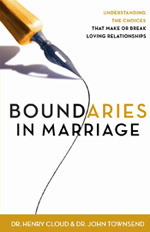 If your marriage is struggling or you want to make a great marriage even better, Boundaries in Marriage has the answers. Learn how to:
If your marriage is struggling or you want to make a great marriage even better, Boundaries in Marriage has the answers. Learn how to:
Transform your relationship into a haven of mutual love, caring, and appreciation.
Protect your marriage from intruders, whether parents, affairs, or addictions.
Handle conflict effectively without losing your voice in the relationship.
Develop a sense of closeness and respect that you’ve never felt before.
Click here to read a sample chapter, watch a free video, and purchase your copy today.
The post Boundaries and Biblical Submission appeared first on Boundaries Books.
March 22, 2016
This One Belief Can Predict Success
 It was the Fourth of July and I (Dr. Cloud) was at a celebration that included a memorial “paddle out” on surfboards in the Pacific Ocean to honor and remember my brother-in-law, Mark. He was a Navy SEAL, a great American, husband, father, hero, brother, and a friend. Mark died on a mission in Iraq in 2008.
It was the Fourth of July and I (Dr. Cloud) was at a celebration that included a memorial “paddle out” on surfboards in the Pacific Ocean to honor and remember my brother-in-law, Mark. He was a Navy SEAL, a great American, husband, father, hero, brother, and a friend. Mark died on a mission in Iraq in 2008.
My ten-year-old daughter Olivia, wanted to participate in the paddle-out to honor her uncle. So, we borrowed a surfboard and began to walk out to the beach where the surfers were gathering, with me carrying the board. I was excited for her to take part in honoring her uncle Mark and was inspired by her fearlessness in wanting to paddle way out into the ocean with all the adults. She did just great and when we came back to the beach we hugged.
She was very proud and thankful for her uncle Mark and we spent a moment talking about all of it before everyone gathered their things to make the long walk back up the hillside to the main event. Everyone, that is, except Olivia and a few other people who had decided to go back into the ocean and catch some waves.
She said to me, “Daddy, I want to stay here and go back out. I will come up and join you guys later.”
“No, Livi. I’m sorry but you can’t. Who will walk back up with you? You can’t walk all the way back by yourself with just your cousin. Sorry,” I said. I did not want her in the commotion by herself at her age, and also, there was no way that she could get that big surfboard all the way back uphill.
“But it’s fine, Daddy,” she said. “There are some adults coming too, and they have to walk back. I will walk with them.”
“No, Livi, just come with me now. It will be a lot less complicated,” I said. Then I played my trump card. “Besides, the surfboard is way, way too heavy for you to carry back. They all have their boards and won’t be able to carry it for you, and I can do that if you come now. If you don’t come with me, how would you ever get it back up the hill?” At this point, I thought I had her.
“Dad!” she said forcefully. “I WILL find a way.”
Those words pierced my heart. I literally had to stop talking as I felt tears welling up in my eyes. It was true: she would FIND a way. Because that’s who she is. The tears I felt were more than just a moment of being proud of her. The tears were that I literally, and I mean literally, felt something happen inside of me. At that moment, I somehow got assured of her future in life.
As a psychologist, I know that there are two kinds of people in the world. People whose circumstances overcome them, and people who overcome their circumstances. As the psychologist, I did not just hear “I will find a way to get the surfboard back.” I heard something automatically coming from her innermost being, from the operating system that made her who she was—the kind of person who says, “I will find a way.”
I knew that mode of thinking would serve her for life, no matter what her future circumstances might be. I knew that she will always “find a way.”
“OK, Livi,” I said. “Have fun.”
“Bye, daddy.” and she waved as she ran to join the group. I did not worry one iota, and in a couple of hours, she and the big heavy surfboard were back where they belonged.
Research has revealed time and again that a belief that one will be successful is one of the strongest predictors of goal achievement. Great leaders build this belief into their people, teams, and culture. They believe that they can do it, and when things get tough, they find a way. They exert what I call “optimistic control,” even in environments where there are many negative realities that they cannot control.
________
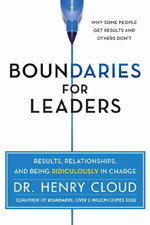 Discover other insights like this in Boundaries for Leaders by Dr. Henry Cloud.
Discover other insights like this in Boundaries for Leaders by Dr. Henry Cloud.
The post This One Belief Can Predict Success appeared first on Boundaries Books.
March 15, 2016
Adults Without Boundaries Raise Kids Without Boundaries
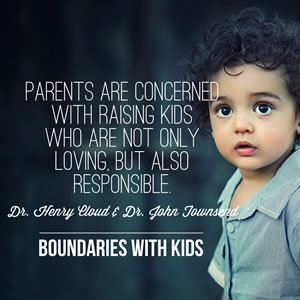 Since writing Boundaries in 1992, we (Dr. Cloud and Dr. Townsend) have spoken to more than a million people about creating boundaries in their lives. Thousands have told us that creating boundaries has enabled them to love and to live better, some for the first time. Nothing is more exciting than to see people grow and change.
Since writing Boundaries in 1992, we (Dr. Cloud and Dr. Townsend) have spoken to more than a million people about creating boundaries in their lives. Thousands have told us that creating boundaries has enabled them to love and to live better, some for the first time. Nothing is more exciting than to see people grow and change.
But from our own experience and that of our audiences and readers, one thing became obvious to us. Adults with boundary problems had not developed those problems as grown-ups. They had learned patterns early in life and then continued those out-of-control patterns in their adult lives, where the stakes were higher. They had learned the following boundary problems as youngsters:
Inability to say no to hurtful people or set limits on hurtful behavior from others
Inability to say no to their own destructive impulses
Inability to hear no from others and respect their limits
Inability to delay gratification and accomplish goals and tasks
Tendency to be attracted to irresponsible or hurtful people and then try to “fix” them
Taking responsibility for other people’s lives
Ability to be easily manipulated or controlled
Struggles with intimacy and maintaining closeness with others
Inability to be honest with those they are close to
Inability to confront others and resolve conflicts productively
Experiencing life as a victim instead of living it purposefully with a feeling of self-control
Addictions and compulsions
Disorganization and lack of follow-through
So we began to think preventively. We love helping adults with boundary problems that have gone on for years, but we also want to help children avoid experiencing what many of us had to go through to repair boundary deficits. This realization led us to write Boundaries with Kids.
Most of the adults we encountered had well-intentioned parents. But many times these parents had had no clue about how to build boundaries into their children; thus they passed on their own limited boundary functioning. Had many of these parents known how to raise a child with good boundaries, much pain could have been prevented. We want to help you develop the kind of character in your children that will prevent many problems with which adults struggle.
In addition, parents knew the pain they had been through and did not want their children to go through the same kind of learning curve. It is better for a child to lose privileges than for an adult to lose a marriage or a career. Furthermore, they realized that boundaries are a key to making any relationship work, and they wanted to know how to live out the principles of boundaries with their children. Their questions can be grouped into three basic areas:
How do I teach boundaries to children?
How do I enforce my own boundaries with my children in appropriate ways?
How can I ensure my children won’t have the problems with boundaries that I had?
As you explore Boundaries with Kids, we will help you answer these questions and help your children develop the character that will lead them into the life that God created them to have.
________
Click here to read a sample chapter and watch a free 4-minute video about Boundaries with Kids.
The post Adults Without Boundaries Raise Kids Without Boundaries appeared first on Boundaries Books.
March 8, 2016
What to Do When Trust Is Broken
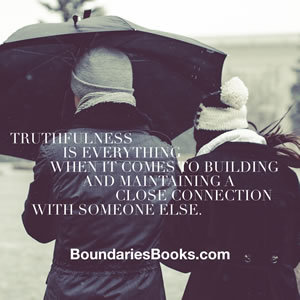 Several years ago, I (Dr. Cloud) went to a conference on working with character disorders, and the instructor was giving a list of priorities to psychologists who treat them. “Character disorder” is a catch-all term, but one way of defining it is “people who do not take ownership and responsibility for their lives.”
Several years ago, I (Dr. Cloud) went to a conference on working with character disorders, and the instructor was giving a list of priorities to psychologists who treat them. “Character disorder” is a catch-all term, but one way of defining it is “people who do not take ownership and responsibility for their lives.”
I will never forget what the instructor said about the number-one priority—other than protecting your personal safety—in treating character disorders. He said, “As soon as there is any kind of deception, stop everything.” If you are trying to help someone and he is lying to you in some way, there is no relationship. The whole thing is a farce, and you should not go any further in trying to help the person until you settle the issue of deception. There are no other issues at that point except that one.
Trust is everything in a helping relationship, and when it is broken, it becomes the only issue to work on. Either fix that or end the relationship. Where there is deception, there is no relationship.
It was wise training and good counsel from a very experienced leader in the field. Thirty-five years of practice had taught him through experience that where there is deception, there is no relationship. Truthfulness is everything when it comes to building and maintaining a close connection with someone else.
We believe that truthfulness is the basis for almost everything. You should have an absolute zero-tolerance policy when it comes to deception. Lying should have no place in your life. Listen to King David’s tough stance on lying: “No one who practices deceit will dwell in my house; no one who speaks falsely will stand in my presence” (Psalm 101:7).
Clear, straightforward, and rigid. Do not tolerate lying, period. That does not mean that if you are lied to once or deceived once that the relationship has to be over. Especially in the area of the person not being totally clear and direct about how he or she feels about certain preferences, or what his or her desires are. Probably every human being is growing in his or her ability to be direct and completely vulnerable with feelings and deeper things of the heart. People grow in that ability. None of us is perfect and secure enough to never use the fig leaf.
But don’t tolerate deception or lying when it happens.
________
 If you’re experiencing deception or struggling to trust someone in a relationship, find practical solutions in The New York Times bestselling book, Boundaries.
If you’re experiencing deception or struggling to trust someone in a relationship, find practical solutions in The New York Times bestselling book, Boundaries.
The post What to Do When Trust Is Broken appeared first on Boundaries Books.
February 18, 2016
How Freedom and Responsibility Can Transform a Relationship
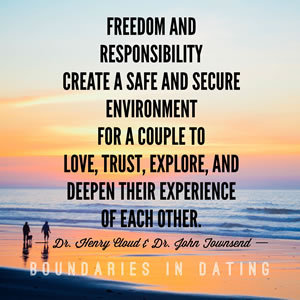 Many of the struggles people experience in dating and marriage relationships are, at heart, caused by some problem in the areas of freedom and responsibility. By freedom, we mean your ability to make choices based on your values, rather than choosing out of fear or guilt. Free people make commitments because they feel it’s the right thing to do, and they are wholehearted about it. By responsibility, we mean your ability to execute your tasks in keeping the relationship healthy and loving, as well as being able to say no to things you shouldn’t be responsible for. Responsible people shoulder their part of the relationship, but they don’t tolerate harmful or inappropriate behavior.
Many of the struggles people experience in dating and marriage relationships are, at heart, caused by some problem in the areas of freedom and responsibility. By freedom, we mean your ability to make choices based on your values, rather than choosing out of fear or guilt. Free people make commitments because they feel it’s the right thing to do, and they are wholehearted about it. By responsibility, we mean your ability to execute your tasks in keeping the relationship healthy and loving, as well as being able to say no to things you shouldn’t be responsible for. Responsible people shoulder their part of the relationship, but they don’t tolerate harmful or inappropriate behavior.
Dating and marriage is ultimately about love. People seek it through dating. When they find it, and it matures, they often make deep commitments to each other. Freedom and responsibility are necessary for love to develop in dating. When two individuals allow each other freedom and take ownership of the relationship, they are creating an environment for love to grow and mature. Freedom and responsibility create a safe and secure environment for a couple to love, trust, explore, and deepen their experience of each other.
Actually, these two elements are necessary for any successful relationship, not just dating. Marriage, friendship, parenting, and business connections depend on freedom and responsibility in order for the attachment to flourish. God designed love so that there can be no fear (loss of freedom) in love, for perfect love casts out fear (see 1 John 4:18). We are to speak the truth in love to each other taking responsibility to protect love by confronting problems.
Healthy boundaries are the key to preserving freedom, responsibility, and ultimately love. Establishing and keeping good limits can do a great deal to not only cure a bad relationship, but make a good one better.
________
Learn how boundaries can transform any relationship with Boundaries in Dating and Boundaries in Marriage.
The post How Freedom and Responsibility Can Transform a Relationship appeared first on Boundaries Books.



